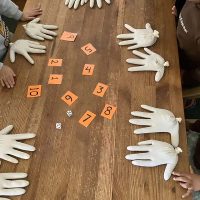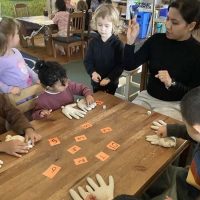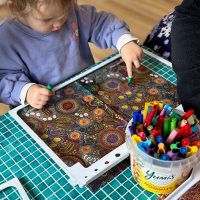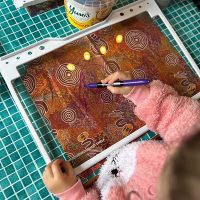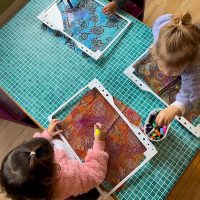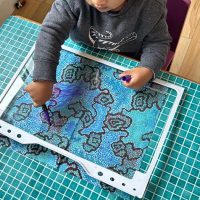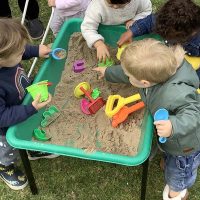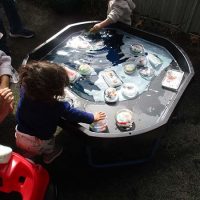Johnson House
Preschool
Story by Educator Sanju
In Johnson House preschool, our Educators are looking at ways to creatively help children to develop their literacy and numeracy skills. Recently the children enjoyed creating their own game. The children filled gloves with sand which they then used to play a number game. A table was set with cards with the numbers 1 to 10 written on them and a dice, and each child had their own set of two sand filled gloves. We started the game by rolling the dice and counting the dots on it. The children then chose the matching number card from the table and used the gloves to count in the same way that we use our fingers to count. For example, if they counted the number six, they counted the glove fingers until they reached 6 and then folded down the remaining four glove fingers.
Most of the children counted the dots independently and picked the correct number card from the table. The children enjoyed the game and were proud as they counted the numbers out loud. The gloves also turned into great fidget sensory toys as the children kept squishing and playing with them.
While playing this game the children had an opportunity to develop their early literacy and numeracy skill by counting and visually identifying the written numbers. They were learning the basic mathematical concepts of adding and subtracting as they saw how many of the sand-glove fingers remaining from ten when they counted to a specific number. Early numeracy skills provide a good foundation to help children to prepare for school and for use in their daily life.
Family Day Care Sydney Wide
Story by Educator Support Officer Catherine
This week I visited Netta’s service (Cockatoo FDC in West Pymble) and provided her with our next embedding Indigenous perspectives pack on incorporating the creative arts through an Indigenous lens.
When Netta saw the art printed fabrics it immediately gave her a great idea for how she could use them with the children. She has recently purchased a new fridge, but instead of discarding the toughened glass shelves from the old fridge, she saved them, thinking they may be useful for some art experiences in the future. With this in mind, she placed the printed fabrics on a table with the glass shelves placed over them, and she provided a container of markers for the children to explore on the glass.
As well as being a beautiful talking point for the Indigenous artworks displayed underneath, the children were able to explore patterns, colours and symbolic representations through open-ended art. It proved to be a really age-appropriate experience for this mixed age group of children to do alongside one another.
Community Playgroups
Story by Playgroup Coordinator Rebecca
At playgroup we provide many different play-based learning opportunities for children. These provide opportunities for parents to actively play with their child and with any other children who may join in, and for children to play side by side, by themselves with their grown up watching or co-operatively with other children.
Having a variety of play experiences to explore helps children to develop their confidence in trying new things, making friends and learning how to interact with others, both children and adults. The ability to understand the world around them and to develop relationships starts the moment a child is born. During play children also begin to learn about themselves, and to develop decision making skills, and their creativity and imaginations.
Play is a child’s ‘work’; it is the foundation of their learning and is one of the most important things for supporting a child’s development.
